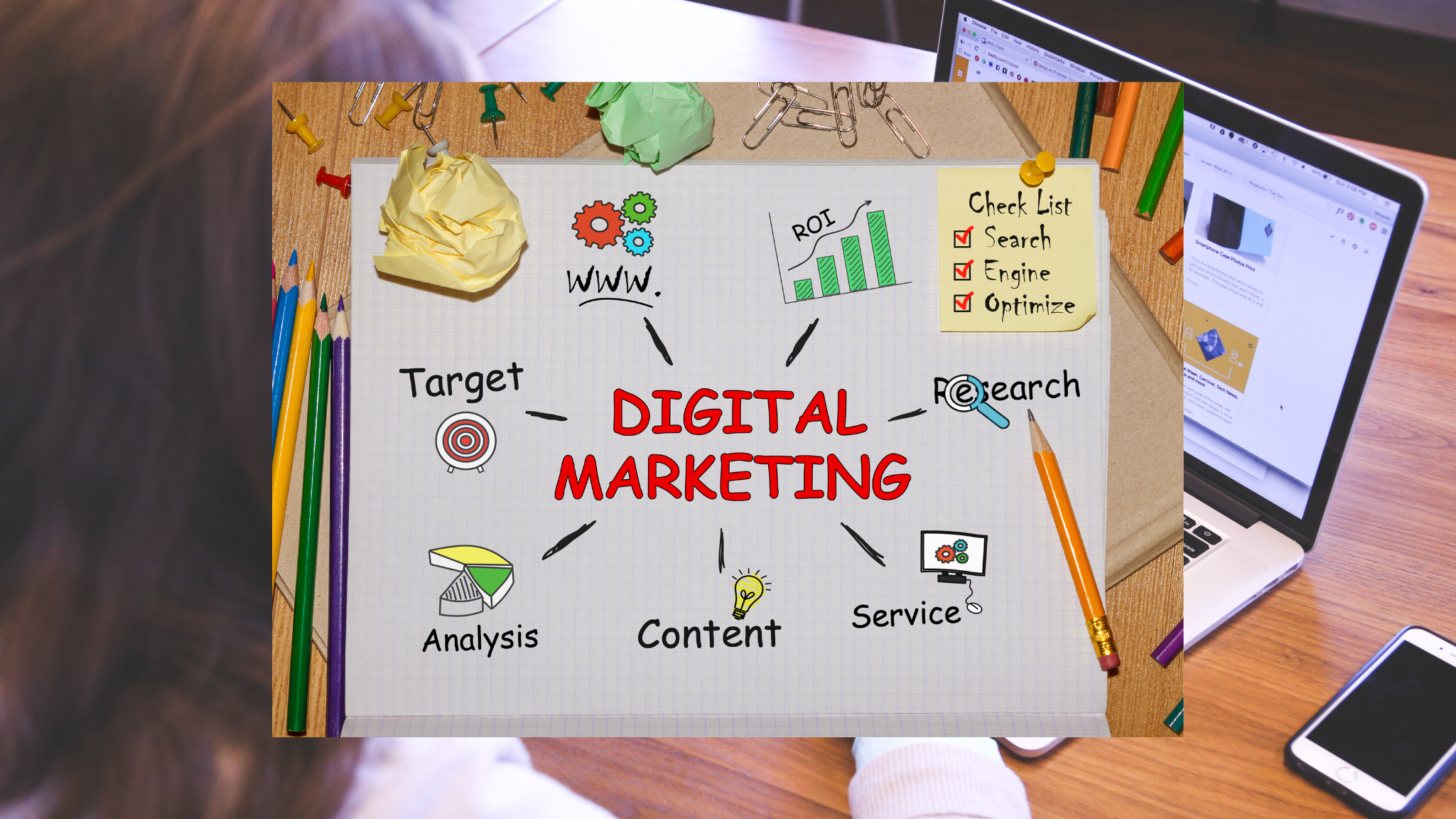In today’s rapidly evolving digital landscape, businesses need a strong online presence to stay competitive. Digital marketing plays a crucial role in building brand awareness, driving traffic, and converting leads into loyal customers. From email marketing to social media management, effective digital marketing strategies are essential for any business looking to thrive in the digital space.
This comprehensive guide will explore different aspects of digital marketing, the importance of crafting a solid digital marketing strategy, and how working with the right digital marketing expert can help your business achieve its growth goals.
What Is Digital Marketing?
Digital marketing refers to the use of digital channels such as websites, search engines, social media platforms, and email to promote products or offerings. Unlike traditional marketing, which relies on offline methods like print ads or TV commercials, digital marketing leverages online platforms to reach a broader audience.
A well-executed digital marketing strategy encompasses multiple tactics such as email marketing, search engine optimization (SEO), and social media marketing. These strategies can help businesses generate qualified leads, increase engagement, and ultimately boost sales.
Why Digital Marketing Strategy Is Essential for Business Growth
Investing in digital marketing is no longer optional for businesses aiming to stay relevant. In a world where consumers spend more time online than ever before, having a solid digital presence is crucial. Here are some reasons why digital marketing efforts are essential:
Increased Reach
With digital marketing, your business can reach a global audience. Unlike traditional marketing methods, which may have geographic limitations, online marketing allows you to connect with potential customers anywhere in the world.
Cost-Effectiveness
Digital marketing is often more affordable than traditional marketing. Techniques like email marketing and SEO can deliver significant returns on investment (ROI) without the hefty price tag of paid advertisements or billboards.
Measurable Results
One of the key benefits of digital marketing is the ability to track performance in real-time. Metrics such as traffic, conversions, and engagement can be easily monitored, providing actionable insights to improve future digital marketing campaigns.
Increased Customer Engagement
Digital marketing channels like social media and email allow for direct interaction with customers. You can receive feedback, answer questions, and address concerns in real time, fostering stronger customer relationships.
Key Digital Marketing Channels

There are several key digital marketing channels that businesses can use to enhance their digital presence. Each channel plays a unique role in the customer sales funnel and contributes to business growth in different ways.
Search Engine Optimization (SEO)
Search engine optimization (SEO) is a cornerstone of any effective digital marketing strategy. SEO involves optimizing your website and content to rank higher on search engine results pages (SERPs), driving organic traffic to your site. By focusing on keywords, website structure, and user experience, businesses can improve their visibility on major search engines like Google and Bing.
An SEO company can help implement strategies to enhance your website’s performance, leading to improved search rankings, more traffic, and higher conversion rates. The key to successful SEO is consistency—SEO efforts require continuous optimization and monitoring to stay ahead of competitors.
Email Marketing
Email marketing remains one of the most effective digital marketing strategies for nurturing leads and engaging with customers. It allows businesses to send targeted messages to subscribers based on their interests, behavior, and stage in the customer journey.
Successful email marketing campaigns are tailored to the needs of potential and current customers, offering personalized content and valuable information. Whether promoting new products or sending out newsletters, email marketing can drive traffic, boost engagement, and convert leads into sales.
Social Media Marketing
In the modern digital world, social media marketing is essential for increasing brand awareness and engaging with your audience. Platforms such as Facebook, Instagram, LinkedIn, and Twitter allow businesses to create a two-way dialogue with potential customers.
A strong social media management strategy involves consistent posting, interaction with followers, and leveraging trends to keep your brand top-of-mind. For businesses seeking to enhance their online reputation, digital marketing agencies often offer social media management as part of their offerings.
Content Marketing
Content marketing focuses on creating and distributing valuable, relevant content to attract and retain a target audience. This can include blog posts, articles, videos, infographics, and other forms of digital media. The goal is to provide solutions to problems that your audience faces, positioning your business as an authority in your industry.
By producing high-quality, SEO-optimized content, businesses can enhance their digital presence, drive traffic, and improve lead generation. Digital marketing agencies can help develop content strategies that align with your business goals and customer needs.
Web Design and Development
A strong online presence starts with a well-designed website. Web development and web design are essential components of digital marketing because your website serves as the foundation for all your digital marketing efforts. A visually appealing and user-friendly site encourages visitors to stay longer, explore your products or offerings, and take action.
Professional web developers work with digital marketers to ensure that your website is optimized for SEO, mobile-friendly, and capable of converting visitors into customers. Digital marketing agencies often provide web design and development as part of their solutions.
Building a Successful Digital Marketing Strategy
Creating a comprehensive digital marketing strategy is essential for achieving your business growth goals. Here’s how you can build a strategy that encompasses various digital channels:
Define Your Digital Marketing Strategy
Before diving into any digital marketing efforts, it’s essential to have a clear understanding of your business goals. Are you looking to increase brand awareness? Drive traffic to your website? Generate leads or boost eCommerce sales? Identifying your objectives will help shape your entire digital marketing strategy.
Identify Your Target Audience
Knowing who your ideal customers are will allow you to create targeted digital marketing campaigns that resonate with them. Understanding their demographics, behaviors, and needs will guide your approach to content marketing, email marketing, and social media marketing.
Choose the Right Digital Channels
With a variety of digital marketing channels available, it’s important to select the right mix for your business. For example, if your goal is to drive traffic to your website, you may want to focus on search engine optimization and content marketing. If you’re looking to engage directly with customers, email marketing and social media management may be more appropriate.
Develop a Content Strategy
A strong content marketing strategy is crucial for building trust with your audience and establishing your brand as an authority in your industry. From blog posts to social media updates, content should be relevant, valuable, and aligned with your customers’ interests.
Monitor and Optimize Your Digital Marketing Campaigns
Once your digital marketing campaigns are live, it’s important to track their performance. Using tools like Google Analytics, you can monitor metrics such as website traffic, conversion rates, and engagement. This will provide you with actionable insights to refine your strategy and improve future campaigns.
Digital Marketing Campaigns for Lead Generation
One of the primary goals is to generate qualified leads for its clients. Lead generation involves capturing the interest of potential customers and guiding them through the marketing funnel until they are ready to make a purchase.
Effective digital marketing strategies for lead generation include:
SEO Optimization
Search engine optimization (SEO) is a foundational component of any successful digital marketing strategy. By ranking higher on search engines, businesses can attract organic traffic from individuals actively searching for their products or offerings. This marketing strategy focuses on optimizing website content, enhancing user experience, and improving technical aspects to ensure your site is easily discoverable by search engines.
Implementing effective SEO efforts requires a comprehensive understanding of keyword research, on-page optimization, and backlink strategies. A reputable SEO expert can help develop and execute a tailored SEO plan that aligns with your specific business goals and objectives.
Email Marketing Campaigns
Email marketing campaigns are a powerful tool for nurturing leads and maintaining engagement with both potential and current customers. Personalized and targeted emails can effectively guide leads through the sales funnel, providing valuable information, promotions, and calls to action that encourages conversions.
To maximize the impact of your email marketing, it’s essential to segment your audience based on their interests and behaviors. This allows you to deliver tailored content that resonates with each segment, ultimately increasing open rates, click-through rates, and conversions.
A digital marketing expert can help design and execute your email marketing strategy, leveraging proprietary marketing software to analyze performance and optimize future campaigns for even better results.
Social Media Marketing
Social media marketing is another critical component of successful lead generation. By actively engaging with your audience on platforms like Facebook, Instagram, LinkedIn, and Twitter, you can boost brand awareness, create community, and generate leads through strategic content sharing and interaction.
Effective social media management involves developing a content calendar, creating engaging posts, and responding to comments and messages promptly. Utilizing digital marketing solutions to track engagement metrics allows you to assess the effectiveness of your social media efforts and adjust your strategy accordingly.
Working with the right digital marketing company ensures that your social media marketing aligns with your overall digital strategy and complements other digital marketing channels.
Content Marketing
Content marketing is a powerful way to generate leads by providing valuable information that addresses the needs and interests of your target audience. By creating high-quality, informative content—such as blog posts, whitepapers, infographics, and videos—you can attract potential customers to your website and position your brand as a thought leader in your industry.
Integrating content marketing into your digital marketing efforts also aids in improving your SEO. Well-optimized content can help increase your visibility on search engines and drive organic traffic to your website.
To enhance the effectiveness of your content marketing, consider collaborating with digital marketing specialists who can help create a robust content strategy that aligns with your growth goals.
Search Engine Marketing (SEM)
While SEO focuses on organic search results, search engine marketing (SEM) encompasses paid strategies, such as pay-per-click (PPC) advertising. Although PPC is a paid advertising method, integrating it with your digital marketing campaigns can amplify your lead-generation efforts.
By running targeted ads on search engines, you can capture the attention of users searching for specific keywords related to your business. This can be particularly effective for promoting limited-time offers or launching new products, as it allows you to quickly drive traffic and generate leads.
An experienced internet marketing expert can help you design and optimize your SEM strategy to maximize ROI and ensure that your advertising dollars are spent effectively.
Web Development and Design
A well-designed and user-friendly website is essential for converting leads into customers. Web development and design play a crucial role in creating a seamless user experience that guides visitors through the sales funnel.
By ensuring that your website is optimized for speed, mobile responsiveness, and intuitive navigation, you can enhance user engagement and reduce bounce rates. Effective web development also involves integrating tracking tools and analytics to monitor user behavior and gather actionable insights for future improvements.
A digital marketing company can assist in creating a website that not only reflects your brand identity but also effectively serves as a powerful marketing tool for your digital marketing strategies.
Measuring the Success of Digital Marketing Campaigns

To determine the effectiveness of your digital marketing efforts, it is essential to track key performance indicators (KPIs) that align with your business goals. Some important KPIs to consider include:
- Cost-Effective Conversion Rates – Measure the percentage of website visitors who take a desired action, such as filling out a contact form or making a purchase.
- Traffic Sources – Analyze where your traffic is coming from, whether through organic search, social media, email marketing, or paid ads.
- Engagement Metrics – Track metrics such as bounce rate, time on site, and pages per session to gauge user engagement and the effectiveness of your website.
- Lead Generation Metrics – Monitor the number of leads generated through each digital marketing channel to assess the effectiveness of your lead generation strategies.
By regularly evaluating these KPIs, you can gain valuable insights into what’s working and what needs improvement in your digital marketing strategy. Adjusting your approach based on data will help you continually refine your tactics and achieve better results.
The Future of Digital Marketing
As technology continues to evolve, the digital marketing space will also change. Emerging trends and technologies will shape the way businesses engage with their customers and generate leads. Here are some trends to watch for in the coming years:
Increased Focus on Personalization
Consumers today expect personalized experiences tailored to their preferences. Businesses that utilize data and analytics to deliver customized content and offers will have a competitive edge.
Video Marketing
Video content continues to rise in popularity, with platforms like TikTok and Instagram Reels driving engagement. Incorporating video into your digital marketing campaigns can enhance storytelling and improve customer connections.
Artificial Intelligence (AI)
AI is transforming the way businesses approach marketing. From chatbots to predictive analytics, AI can help businesses automate processes, analyze data, and deliver personalized content to users more effectively.
Voice Search Optimization
With the increasing use of voice-activated devices, optimizing for voice search will become essential for digital marketing strategies. This involves focusing on long-tail keywords and natural language queries to ensure your content is discoverable by voice search.
Integration of Augmented Reality (AR)
As AR technology advances, businesses will begin to leverage it for interactive marketing experiences. This could include virtual try-ons, immersive storytelling, and interactive advertisements that engage users in new ways.
What are Strategies in Digital Marketing?
Digital marketing strategies refer to a series of steps designed to achieve specific marketing goals through digital channels. These strategies utilize digital marketing tools like social media platforms, search engine optimization (SEO), email marketing, and content marketing to build brand awareness, drive website traffic, and convert potential customers. A strong digital marketing strategy must focus on the target audience, aligning with the business’s objectives, and ensuring high-quality content is delivered across various digital marketing channels. Effective strategies also incorporate paid advertising, influencer marketing, and social media marketing, optimizing the customer experience through landing pages, social media posts, and targeted marketing messages.
What are the 4 Major Types of Digital Marketing?
The four major types of digital marketing are:
- Search Engine Optimization (SEO) – Focuses on optimizing your site to rank higher in organic search results on search engines like Google, increasing online visibility and driving website traffic.
- Social Media Marketing – Utilizes platforms like Facebook, Instagram, and LinkedIn to engage with your target market, build brand awareness, and promote products through social media channels and ads.
- Content Marketing – Involves creating and sharing digital content, including blogs, videos, and infographics, to engage with your audience, enhance brand loyalty, and drive conversions.
- Email Marketing – A direct approach to reach potential customers through personalized content, promotions, and updates, which helps nurture leads and increase sales.
What are the 7 C’s of Digital Marketing?
The 7 C’s of digital marketing provide a framework for creating an effective digital marketing strategy:
- Customer – Focus on the needs and preferences of your target audience.
- Content – Develop high-quality content that resonates with your audience and is optimized for search.
- Context – Deliver content within the appropriate channels and at the right time.
- Community – Foster engagement and loyalty through active interaction on social media networks and other digital channels.
- Convenience – Ensure an easy-to-navigate user experience across all devices, especially mobile.
- Consistency – Maintain a consistent brand message across all platforms.
- Conversion – Focus on turning leads into actual customers through marketing tactics that drive desired actions.
What is the Digital Marketing Strategy?
A digital marketing strategy is a plan to promote a brand, product, or offering using digital channels. It includes detailed steps on how to reach your target audience, boost online visibility, and drive conversions. This can involve SEO, content marketing, email marketing, social media marketing, and paid advertising. To be effective, it must align with your business goals, focus on your target market, and leverage the right tools and digital marketing efforts.
What are the 7 Pieces of Digital Marketing?
The 7 pieces of digital marketing refer to the essential components needed to execute a successful strategy:
- Website – Your central hub for digital interactions.
- SEO – Optimizing for better rankings and traffic.
- Content – Informative and engaging material that supports your marketing.
- Email Marketing – Direct outreach to potential and existing customers.
- Social Media – Engaging with your audience on platforms like Facebook, Instagram, etc.
- Paid Advertising – Using tools like Google Ads and native advertising to increase reach.
- Analytics – Tracking and refining marketing efforts based on data.
What are the Top 7 Types of Digital Marketing?
The top 7 types of digital marketing include:
- SEO – Improving rankings and traffic via search engines.
- Content Marketing – Creating and sharing valuable content to engage and convert your audience.
- Social Media Marketing – Leveraging social media channels for promotion and engagement.
- Email Marketing – Targeting customers with personalized emails.
- Influencer Marketing – Partnering with influential figures to expand reach.
- Paid Advertising – Using Google Ads and other platforms to promote products or offerings.
- Video Marketing – Creating engaging video content for platforms like YouTube or social media.
Conclusion
The landscape of digital marketing is continuously evolving, and businesses must stay informed and adaptable to succeed. Implementing a comprehensive digital marketing strategy that includes SEO, email marketing, social media, and content marketing will position your brand for success in the competitive online environment.
Partnering with a skilled digital marketing expert can help streamline your efforts and ensure that your strategies align with your business growth goals. By leveraging digital marketing approaches, businesses can enhance their digital presence, generate qualified leads, and ultimately drive conversions.
As you navigate the world of digital marketing, remember that success takes time and consistent effort. By focusing on building relationships, providing value, and utilizing the right tools and strategies, you can create a powerful digital marketing ecosystem that supports your business objectives.
By investing in effective digital marketing solutions, you’ll be well on your way to achieving lasting success in today’s digital-first marketplace. Whether you’re seeking to enhance your current strategies or starting fresh, embrace the power of online marketing and watch your business flourish.






